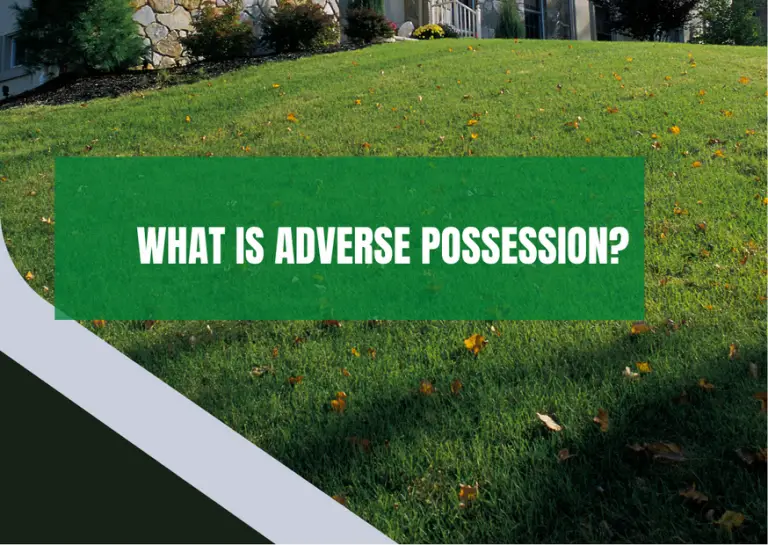What Would Cause Termination of A Real Estate Contract?
What Would Cause Termination of A Real Estate Contract?
There are a few reasons why a contract might be terminated. Some of the most common reasons are as follows:
1. The Property Is Sold
If you sell your property, the contract may be terminated as long as you have not taken any actions that would prevent the sale from going through. This includes making any changes to the property without the seller’s permission, violating the terms of the contract, or refusing to sign the final documents.
2. The Seller Quits
If the seller quits the contract, the contract may be terminated. This can happen if the seller does not meet the terms of the contract, if the seller is unable to perform the agreed-upon obligations, or if the seller is convicted of a crime that would make them ineligible to sell the property.
3. The Buyer Quits
If the buyer quits the contract, the contract may be terminated. This can happen if the buyer does not meet the terms of the contract, if the buyer is unable to perform the agreed-upon obligations, or if the buyer is convicted of a crime that would make them ineligible to buy the property.
4. The Property Is Involved In A Dispute
💥🎁 Christmas & Year-End Deals On Amazon !
Don't miss out on the best discounts and top-rated products available right now!
🛒 Shop Now and Save Big Today!*As an Amazon Associate, I earn from qualifying purchases.
The contract may be terminated if there is a dispute over the property. This can happen if one party does not meet the terms of the contract, if the parties cannot reach an agreement, or if one party files for bankruptcy.
What Is The Penalty For Cancelling A Real Estate Contract?
You run the danger of forfeiting your deposit if you seek to end a real estate transaction without complying with the conditions. Nevertheless, your contract will often have conditions that need to be satisfied by a certain day. Your money should be refunded if any conditions are not met, provided you have paid it in a timely manner.
If you have not paid your deposit or have been in breach of any other contract, your money can be reclaimed from the seller, and the seller will be entitled to compensation from you if they breach the contract.
If you are not satisfied with the property you purchased, there is little chance that your money can be refunded. Neither are there many laws that protect buyers against unfair business practices when they purchase and sell the property.
If you are unhappy with the property, you should make that known immediately. However, there is little chance that the seller can be forced to return the deposit or refund your money if they have already closed on the property. These are both costly propositions, and they have little to gain in doing so.
💥🎁 Christmas & Year-End Deals On Amazon !
Don't miss out on the best discounts and top-rated products available right now!
🛒 Shop Now and Save Big Today!*As an Amazon Associate, I earn from qualifying purchases.
If you are dissatisfied with a real estate contract and want to terminate it without any recourse, you will face legal obstacles from the moment you reach out to your seller. Your seller will most likely have grounds for breaching the contract themselves and will not tolerate any breach of their own contract.
You can use some methods to terminate your contract with the least amount of damage to yourself possible.
How Do You Write An Addendum To A Real Estate Contract?
An Addendum is a document that is typically attached to, or appended to, a real estate contract. It can provide further detail on the contract or resolve any discrepancies that may have arisen since it was signed.
To write an Addendum to a real estate contract, you will first need to identify any discrepancies that may have arisen since the contract was signed.
This can be done by interviewing the parties involved and analyzing any written agreements that may have been made. Once you have identified any issues, you will need to propose a solution to resolve them.
💥🎁 Christmas & Year-End Deals On Amazon !
Don't miss out on the best discounts and top-rated products available right now!
🛒 Shop Now and Save Big Today!*As an Amazon Associate, I earn from qualifying purchases.
If all parties agree to your proposal, you can then sign the Addendum as a formal amendment to the original contract.
If all parties do not agree to your proposal, then the Addendum may not be signed and the issues may continue to plague the contract. In this case, you may need to seek legal counsel to ensure that your rights are protected.
How Do I Fill Out A Real Estate Contract In South Carolina?
If you’re considering buying or selling a home in South Carolina, you’ll want to ensure you have a solid real estate contract. Here’s what to include:
1. Agreement To Purchase Or Sell
The first thing you’ll need to do is agree to purchase or sell the property. This can be done in writing or verbally. Make sure you both understand the terms of the contract and that you’re both happy with it.
2. Listing Information
Next, you’ll need to provide the seller with your name, address, and contact information. You’ll also need to list the particulars of the home you’re interested in purchasing or selling, such as the number of bedrooms and bathrooms, square footage, and price.
3. Conditions Of Sale
💥🎁 Christmas & Year-End Deals On Amazon !
Don't miss out on the best discounts and top-rated products available right now!
🛒 Shop Now and Save Big Today!*As an Amazon Associate, I earn from qualifying purchases.
One of the most important parts of a real estate contract is the conditions of sale. These stipulate things like the amount of time the property is available for inspection, how the sale will be conducted (by private contract or public auction), and who will be responsible for any damages that may occur during the sale.
4. Purchase Or Sale Agreement
Once everything is approved by both parties, you’ll need to sign a purchase or sale agreement. This document outlines the terms of the sale, such as the price, the down payment, and when the title will be transferred.
5. Closing
The closing is the final step of the sale process. This will involve the transfer of title to the property and the purchase or sale price payment. Make sure you have all the paperwork in order and have enough money saved up to cover any costs associated with the sale.
How Do I Get Out Of An Exclusive Real Estate Contract?
For these reasons, calling the broker and explaining your wish to terminate the contract with their agent is the best course of action for terminating a contract with a Realtor.
It might be time to get out if you’re in an exclusive real estate contract. Exclusive contracts can be binding agreements, and breaking them can be costly but are three ways to get out of an exclusive contract:
1. Seek Legal Advice
💥🎁 Christmas & Year-End Deals On Amazon !
Don't miss out on the best discounts and top-rated products available right now!
🛒 Shop Now and Save Big Today!*As an Amazon Associate, I earn from qualifying purchases.
If you’re unsure about whether you’re in an exclusive contract, or if you’re just not comfortable with it, speak to an attorney. An attorney can help you understand your rights and can provide you with advice on how to break the contract if you decide that you need to.
2. Negotiate A Break
If you’re not comfortable negotiating a break yourself, you can ask your potential landlord to negotiate on your behalf. Be prepared to offer significant money for the inconvenience and wasted time.
3. Break The Contract Early
If you don’t feel comfortable negotiating a break, or if you don’t think you can get the landlord to break the contract, you may want to consider breaking the contract early.
This can be done by either quitting the lease or by giving the landlord notice that you’re breaking the contract. Be prepared to pay any associated damages.
What Does An As Is Real Estate Contract Mean In Florida?
Real estate in Florida is sold ‘as is,’ which means in its existing condition. If the buyer inspects the property and detects a major problem, or if the seller notifies them of a prospective problem, the seller does not need to be concerned.
💥🎁 Christmas & Year-End Deals On Amazon !
Don't miss out on the best discounts and top-rated products available right now!
🛒 Shop Now and Save Big Today!*As an Amazon Associate, I earn from qualifying purchases.
Regardless of the repairs’ severity, the seller will not be required to make them. The buyer may look elsewhere or make an offer with reservations.
If the buyer has a licensed inspector review the home and finds no defects, then the buyer can assume that the home is in good condition.
Contracts are sold by private owners as is; this means that neither party is responsible for any repairs or existing problems with the property. The contract should include a list of known defects within the home and a time frame for detecting and repairing any such problems.
What Clauses Are Included In A Commercial Real Estate Sales Contract?
When purchasing a property, it is important to review the terms of the sale contract in order to protect yourself. A number of clauses are important when purchasing a property, including warranties, representations, closing conditions, and covenants.
Warranties
One important clause in a commercial real estate sale contract is a warranty. A warranty is a guarantee that the property is fit for its intended use. This safeguard protects buyers from defects in the property that could cause serious problems.
Representations
💥🎁 Christmas & Year-End Deals On Amazon !
Don't miss out on the best discounts and top-rated products available right now!
🛒 Shop Now and Save Big Today!*As an Amazon Associate, I earn from qualifying purchases.
In a sale contract, representations are promises made by the seller. These promises must be accurate in order for the buyer to make an informed decision. For example, the seller must disclose any known problems with the property.
Closing Conditions
Closing conditions are the conditions that must be met in order for the sale to proceed. These conditions can include but are not limited to the signing of the contract and the delivery of the property.
Covenants
A covenant is a term that is included in many sale contracts. Covenants are agreements between the buyer and seller that protect the buyer. For example, a covenant might restrict the use of the property in a certain way.
What Is The Difference Between Pending And Under Contract In Real Estate?
When a house is classified as pending, it signifies it is under contract, and there are no further contingencies on the sale.
When a property is classified as pending, it is significantly closer to being sold than when it is under contract, as the buyer has successfully negotiated with a seller a sale price and is under contract to buy the home.
💥🎁 Christmas & Year-End Deals On Amazon !
Don't miss out on the best discounts and top-rated products available right now!
🛒 Shop Now and Save Big Today!*As an Amazon Associate, I earn from qualifying purchases.
The contract must be signed by all parties, and a down payment must be paid in order for the property to be classified as pending.

